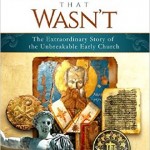So Elizabeth Scalia welcomed me to Patheos on her blog a couple of days ago, and quoted my post “Righteously Bad Theology.” One of her readers left a rather cryptic comment on her post:
wonderful selection, I’m Catholic patheos is taking the progressive approach…
I’m assuming that some word like “glad” or “pleased” or “happy” was omitted between the words “I’m” and “Catholic”, in which case the reader is assuming that I’m going to be a progressive voice at Patheos. I think this would surprise anyone who knows, so I thought it would be a good ideal to put down just where I’m coming from.
As I indicated a while back in “As Catholic as the Pope“, my goal is to be a faithful son of the Church, believing what the Church teaches and doing what the Church requires, while following Christ as an intentional disciple. This is not to say that I don’t struggle with what the Church teaches and requires—I do.
Ironically, the part I struggle with most is the Church’s social teaching. See, I spent twenty years as an Episcopalian; and in that denomination the quest for social justice has led many of the leaders right out of Nicene Christianity and into the wilds of I-know-not-what. (I base this on published remarks about the divinity of Christ, Christ’s resurrection, and such-like.) As I result, I’m suspicious of people who use phrases like “social justice”, and it’s hard for me to accept and internalize some of the Church’s teachings in that area. (I’m working on this.)
On the other hand, I don’t struggle at all with what Pope Benedict once called the “canon of dissent”. I’m perfectly happy with a celibate male clergy, I’m opposed to abortion, and I think sex outside of heterosexual marriage is sinful.
But on the gripping hand, I’m not a traditionalist either. I was born in 1963; if I’ve ever been at a Latin mass, I don’t remember anything about it. I don’t pine for earlier eras in the life of the Church. I don’t object to beautiful Masses with all of the trimmings; as I say, I was an Episcopalian for twenty years, and if there’s one thing Episcopalians are good at it’s beautiful liturgies. But for me, it’s all about the Eucharist. When Jesus is there, I’m good.
As a Dominican, my primary interest is the salvation of souls. And that requires holding two things in tension: the reality of sin, and the love and mercy of God. Both are real; both must be taken seriously. I can’t do anything that will make God hate me. Equally, I can’t fully receive God’s love without leaving my sins behind. And when it comes to others: I will not lie to them, and say their sins are not a problem, because they are. But neither will I cast others into the outer darkness because of their sins. (At least, not in my best moments.)
So I’m not progressive; and I’m not traditional; I’m just sort of mere.











